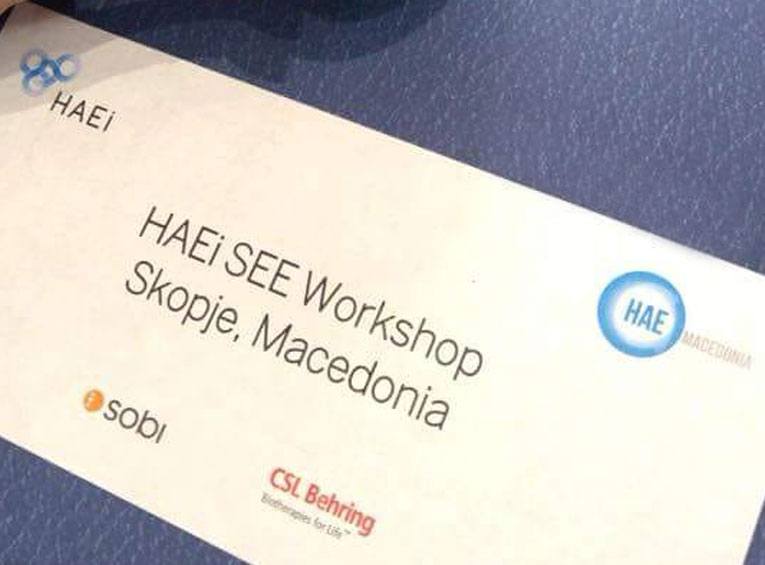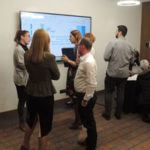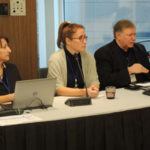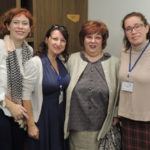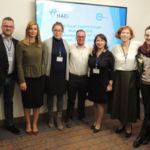By Natasa Angjeleska, HAEi Regional Patient Advocate South Eastern Europe
Before being nominated as HAEi Regional Patient Advocate for the South Eastern Europe countries (SEE), I established communications through my colleagues from HAE Macedonia with some of the HAE patients in this region. We were motivated by the will to meet with patients from neighboring countries, and to share mutual life challenges, sympathize with each other, and share ideas for assistance.
At our first Balkan meeting of patients and doctors held in June 2016 in Skopje, Macedonia we gathered together patients and physicians from 10 countries and started more organized communications afterwards, as well as some joint activities that helped us stay motivated for the second SEE meeting held in September 2017 in Skopje. Once more we shared successes from some of the countries as well as discussed what worries us most.
This year we were proud to host another great workshop taking part in Skopje, Macedonia 28-30 September 2018. We had 70 participants out of whom 44 were patients/caregivers and 20 physicians from 11 countries in SEE, as well as six pharma representatives. The SEE region covers six countries with registered patient organizations: Bulgaria, Macedonia, Romania, Serbia, Turkey – and we were excited to welcome the newest member organization, Montenegro. Furthermore, we have very active patient groups in Albania, Croatia, and Slovenia – with the potential to have another member organization soon in Croatia. It was so exciting to have patients’ representatives from Bosnia and Herzegovina at the regional meeting this year. A couple from Tuzla, together with Dr Mensuda Hasanhodzic seemed very enthusiastic and started planning patient activities in this country, and they hope to identify and gather more patients. We were also happy to have physician representatives from Kosovo at our meeting this year and already discussed how we can assist in identifying patients in this country as well.
Our guest speakers for the regional workshop were Dr Bruce Zuraw and Dr Sandra Christiansen who delivered very motivational presentations and lectures divided into three sub-sessions:
HAE Fundamentals, covering basic information about HAE – What should every patient know about the science underlying HAE? How do you make the HAE diagnosis? Who in the family should be tested for HAE and what tests do you recommend? What if I have HAE symptoms, but my C1-inhibitor is normal? What facts or data could be used if we have to visit the emergency room? What, from the physician perspective, can a patient do to make appointments more effective and efficient?
Currently Available Treatments – An overview of HAE treatments that are currently available – What are the risks/benefits of anabolic steroids for prevention in countries with no HAE therapies; and what is the professional opinion regarding the use of these medicines when nothing else is available?
Looking to the future – An overview of HAE-related scientific breakthroughs in the past 5 to 10 years from academia as well as industry, Current and planned clinical trials – mechanism of action for planned or new therapies.
The doctors were available throughout the whole two-day workshop for questions from participants.
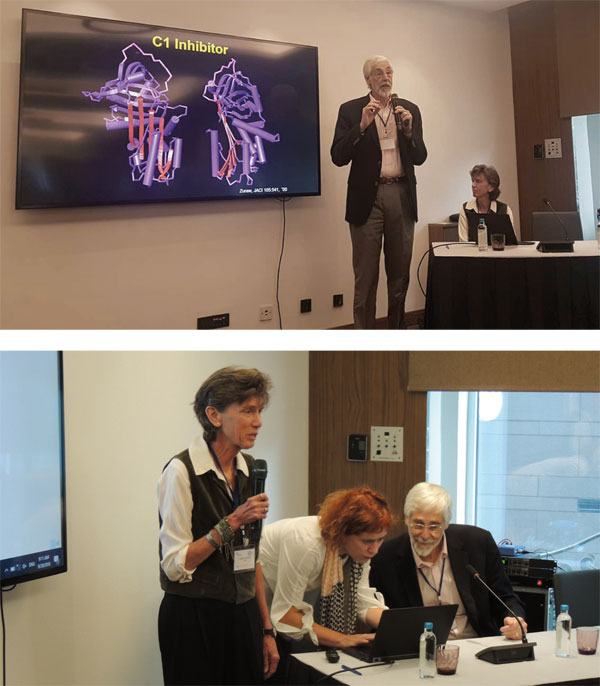
Dr Bruce Zuraw and Dr Sandra Christiansen gave very motivational presentations and lectures about HAE
Dr Vesna Grivcheva Panovska, a dedicated physician for the HAE adult patients in Macedonia, presented about the newest treatment options for HAE patients and shared the latest data published about the Oral Plasma Kallikrein Inhibitor for Prophylaxis in Hereditary Angioedema – or about the effects of BCX7353. She co-authored the article about this new therapy that is going to be the very first oral treatment for HAE patients, and we were happy to hear about the positive outcomes from the clinical trials in which patients from our region are also part.
Patient involvement in advocacy is the key to improve conditions and access to therapies worldwide. This is why the president of HAEi, Anthony J. Castaldo and myself held an interactive session with participants to hear and discuss successful activities in some of the countries so that we can learn from each other. For instance, representatives from Serbia secured funding and access to novel therapies after a long year of “wrestling” and advocacy with health officials. We heard about the long period of advocacy from representatives from Turkey and the constant obstacles that are faced in reimbursement procedures. We learned about the challenges Romanian patients face and about the extremely important joint activities with physicians, and alliances with other rare disease associations, as in the case of Macedonia.
This year our participants had the opportunity to hear about HAEi resources available for the member organizations and patient groups, especially HAEi web hosting and HAE Connect. HAEi Executive Director Henrik Balle Boysen and HAEi Project Manager Ole Frölich met with the country representatives to have a practical presentation of these tools that patient groups and organizations can get access to free of charge. Already at the workshop, several countries expressed that they will join HAE Connect and many were interested in having their web page hosted at www.haei.org.
Also, we had the opportunity to hear the current state with patients, physicians, care centres, available medications, and challenges and successes from each of the countries present at the meeting. Among them were the workshop’s youngest presenter coming from Romania, who took the challenge to speak in front of the audience and received huge applause.
The meeting was very motivational and emotional, and it is of huge importance to have these opportunities to meet and share among representatives in our region. We live in the same geographical territory; we share a lot from our history, food, folklore, culture and habits. These things sometimes unite us, while other times divide us, but now we have a higher unifying goal: to join together in the care and fight for an improved life for HAE patients in each country in the SEE region.
Several tasks for the coming period are set: to reach more patients so that no-one is left alone, in struggle and/or isolated; fight for awareness about the seriousness of the condition; seek improved diagnosis; demand access to treatments; work for individualized care for patients; seek for friendly and expert physicians respected for their knowledge and expertise by the public and authorities; establish cooperation with authorities; network and collaborate with other patient groups and associations.
Some of these tasks may be easily accomplished in some of the countries, while there may be obstacles in others. Nevertheless, we must not be discouraged. On the contrary, we should always think that “Winners are not those who didn’t experience defeat, winners are those who never quit!!!” – as said by the Macedonian bestseller writer and inspirational speaker Kosta Petrov.


